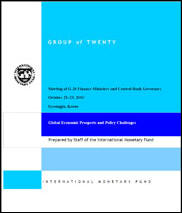Group of Twenty -- Meeting of G-20 Finance Ministers and Central Bank Governors
IMF Note on Global Economic Prospects and Policy Challenges
October 21-23, 2010, Gyeongju, Korea
About the Executive Summary
The Following executive summary is from a note by the Staff of the IMF prepared for the October 21-23, 2010 meeting of the Group of Twenty Finance Ministers and Central Bank Governors in Gyeongju, Korea
Read the Full text ![]()
Executive Summary
The global recovery is fragile and uneven, with financial sector strains having receded somewhat, but markets remaining acutely sensitive to sovereign and banking sector risks. Global growth was stronger than expected during the first half of 2010, but is projected to slow during the second half of 2010 and the first half of 2011.
- In advanced G-20 economies, the recovery is beginning to gradually transition from being driven by policy-related stimulus and inventory rebuilding to investment, but private consumption remains sluggish.
- Activity in emerging G-20 economies has been led by a recovery in domestic demand and the rebound in global trade, but has recently begun to moderate to more sustainable levels.
Downside risks to economic recovery remain large. Further strains in the U.S. housing market, the lack of credible medium-term fiscal consolidation plans, risks of spillovers from turbulence in sovereign debt markets, risks of overheating and asset price bubbles in emerging economies owing to large capital inflows, and fears of financial and trade protectionism and currency instability continue to weigh on economic recovery.
Rebalancing of global demand remains the lynchpin for securing strong, sustainable, and balanced growth. This involves internal rebalancing in advanced economies, anchored by a shift from public- to private-demand-led growth, and external rebalancing, underpinned by an increase in net exports in advanced deficit countries and a decrease in net exports in emerging surplus economies.
- External and internal rebalancing interact in important ways—increases in net exports in advanced countries would bolster growth, allowing greater scope for fiscal consolidation, while strengthened domestic demand in emerging economies would help support growth in the face of lower exports.
- Currently, internal rebalancing remains sluggish in major advanced G-20 economies. External imbalances, after declining during the crisis, are projected to not narrow any further over the medium term. Many of the distortions underlying large pre-crisis imbalances—including undervalued exchange rates in key emerging economies and insufficient domestic saving in advanced deficit economies—remain.
While continuing to support recovery, policy priorities across G-20 countries should increasingly focus on medium-term requirements, aimed at rebalancing global demand.
- Advanced economies must expeditiously repair and reform financial sectors, to normalize credit conditions and support internal rebalancing. This would help reduce the need for the highly accommodative monetary policy stance in these economies, which is contributing to large capital inflows to emerging economies.
- Advanced economies should also put in place and begin implementing credible medium-term fiscal consolidation plans to anchor confidence, crowd-in private demand, and create room for fiscal policy maneuver. As part of these plans, consolidation should begin in 2011. If global growth risked to slow appreciably more than expected, countries with fiscal room could postpone the planned consolidation, and all but the most vulnerable economies should allow automatic stabilizers to operate freely.
- In key emerging surplus economies, exchange rate appreciation should begin in earnest, accompanied by an acceleration of reforms aimed at boosting domestic demand—in the absence of policies targeting the elimination of underlying distortions, global imbalances will continue to widen, threatening growth prospects in both advanced and emerging economies.

